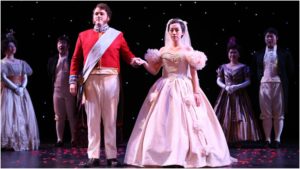
Manhattan School of Music 2017-18 Review – La Cenerentola: A Solid Production Featuring Aspiring Talent Through & Through
By Jennifer PyronAfter a delightful performance of Isouard’s “Cendrillon” during their fall 2017 season, Manhattan School of Music (MSM) showcased another version of the beloved story of Cinderella this weekend, with Rossini’s “La Cenerentola. ” While still celebrating the success of “The Barber of Seville” and not yet 25-years-old, Gioacchino Rossini met Jacopo Ferretti and together they decided to create “La Cenerentola, Ossia La Bontá In Trionfo.” Both the libretto and music were written in less than a month’s time, which made for a seemingly hasty premiere on January 25, 1817. However, Rossini’s “La Cenerentola” has left a lasting impact on audiences since then and continues to be one of his most exciting operas.
Standout Family Members
Presented at the Gerald W. Lynch Theater, Maestro Gary Wedow lead an enthusiastic orchestra in Rossini’s overture. Each musician played with gusto and set the tone for a lively and enlightening performance. The opening act presented the two evil step-sisters quarreling, while an overwhelmed Cenerentola busied herself with chores. Kelly Singer, as Clorinda, and Polixeni Tziouvaras, as Tisbe, immediately brought life and comedy to the stage with their interpretations. Dressed in an array of playful colors that matched their peculiar hairstyles and personas, both singers were fully-engaged in their roles and having fun. Both also exemplified quality vocal technique that made for a delightful experience. Elizabeth Clancy did a superb job with the costume design and Peter Harrison added the perfect amount of details in his stage design to create an intimate and beautiful setting.
In response to Clorinda and Tisbe’s quarreling, Don Magnifico, played by José Luis Maldonado, woke up in distress while he was in the middle of a particularly interesting dream. Maldonado was an excellent choice for the role of Don Magnifico. His voice resonated with delight and he was the master of appropriate dynamics that created interesting moments while he sang. Rossini’s Don Magnifico character was designed to symbolize both the light and dark perspectives of the story, so the necessary vocal technique and acting skills that were required to fill this role had great impact on the opera. Maldonado delivered all the audience hoped for and led everyone on the journey to discover who the real Prince Ramiro was in the story.
A Tutor in Disguise & The Princess of the Night
The audience was also introduced to Alidoro, the Prince’s tutor, in disguise as a beggar. Andrew Henry had a gentle yet poignant impact on the role as Alidoro. He emphasized great care and precision while singing so that he was seen and heard as an ethereal guide throughout the opera. Cenerentola, played by Hongni Wu, also initially presented herself as a youthful and innocent character that was restrained from fully expressing herself because of the years she lamented under the scorn of her family. However, as the opera progressed, Wu’s voice blossomed into a wide array of colors and emotions. She developed into her character and proved to be a remarkably outstanding voice.
During Act One, Scene Two, the audience witnessed the “Prince” and Don Magnifico in conversation about their sophisticated love of wine. Both Shen and Maldonado sang boldly together while portraying the comical turn of events due to Clorinda and Tisbe’s obsessive affections. This scene was particularly comical and the audience enjoyed everyone’s attention to detail while diligently playing into their role.
Mystery & Darkness
Cenerentola made her grand entrance as a beautiful and mysterious lady of the ball in Scene Four, which created great suspicion. Wu’s stoic and kind demeanor was on display in a white embellished gown that lit up the stage. Her voice was pure and bright as she sang before everyone rushed off to dinner and further gossip. After the ball, Magnifico grew suspicious and paranoid about the Courtiers who were teasing him. The evil side of Magnifico’s character was highlighted in this scene and Rossini’s music made for an exciting twist. Clorinda and Tisbe aimed to comfort their father, but Magnifico’s ego proved to be more important. Singer and Tziouvaras showed great vocal stamina and their lustrous tones carried over the height of the drama. Wu also continued to sing with beauty as she expressed her interest in love over riches.
Prince Charming
Philippe L’Esperance, as Prince Ramiro, opened up his heart to the audience in this scene while his character declared his quest to search everywhere for Cenerentola, after she rushed off from the ball. His voice resonated with honesty and tenderness. When Wu and L’Esperance sang together, it made for a truly special experience that further added to another successful opera for MSM.


